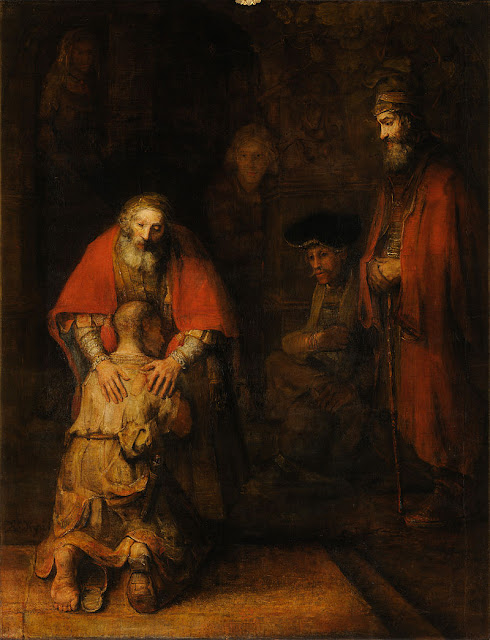In Search of the Father
 |
| (The Return of the Prodigal Son by Rembrandt) |
Though we are no longer condemned to slavery, we are still capable of falling. We are very small creatures, but we must learn that we are very beloved creatures—beloved by the Father of us all. We are sons and daughters of the King. And if we fall, we must cry out to God and not hide ourselves like Adam and Eve hid themselves in the garden. No, if we are poor and naked and humiliated, if we have lost our dignity, it is precisely at that moment we must run to our Father. This honours Him greatly, for it is an act of total faith, relying on no merits of our own, an act of belief in His Fatherhood.
We do not come to Him and say, ‘Hello Papa, I am a good son; and thus it’s great to be with You.’ The reality is, we are sinners who are in the process of being set free. If we sin, we must run home to our Father as swiftly as we can and throw ourselves into His arms. Like the parable of the Prodigal Son . . . we will discover that the Father loves. The Father sees through all the human damage. He sees the image of His own Son in each of us, and in this we must trust.
This is our task—to learn to trust. This growth in trust is a long discipleship through which we gradually learn in the heart of our souls that God is Who He says He is. And thus it is also a long growth in ‘sonship,’ of learning to be true sons. As we come to know this totally, we will learn that the Father gives us everything, so that we may give a little gift back to Him.
This is the flow of love, the indwelling life of the Holy Trinity in baptised Christians. This is the communion and the liberation, which is not only in Paradise but even now circulates through the world through the sacrifice of the Son. And our sufferings, united to Jesus’ sufferings, are part of this sacrifice that redeems the world. The subject of mercy, love, and sacrifice is immense and I have run out of time, but let me close this talk with a little passage that is in the Psalms of David. David once was consumed by fear, and he overcame fear with courage and grace. In Psalm 56 he prays:
‘When I begin to fear, I will trust in you.’
We often do not feel this trust, but growth in such trust comes with practice. Another powerful saying of David’s is when he faces Goliath. King Saul has offered the boy his armour, the king’s armour, the king’s weapons. David is very young, a mere boy, he is not Michelangelo’s David. He is the least of the sons of Jesse. The armour is too heavy for him. He puts it aside and says:
‘The battle belongs to God.’
In other English translations it is: ‘The battle is the Lord’s’ (1 Samuel 17: 47).
Yes, the Lord will fight for us and with us and through us. We will be victorious and fruitful in the world to degree that we have become as little children, trusting that He is our Father, and our Father is with us.”
~Michael O’Brien (from a talk given in 2008 in Rimini, Italy)
.jpg)

Comments